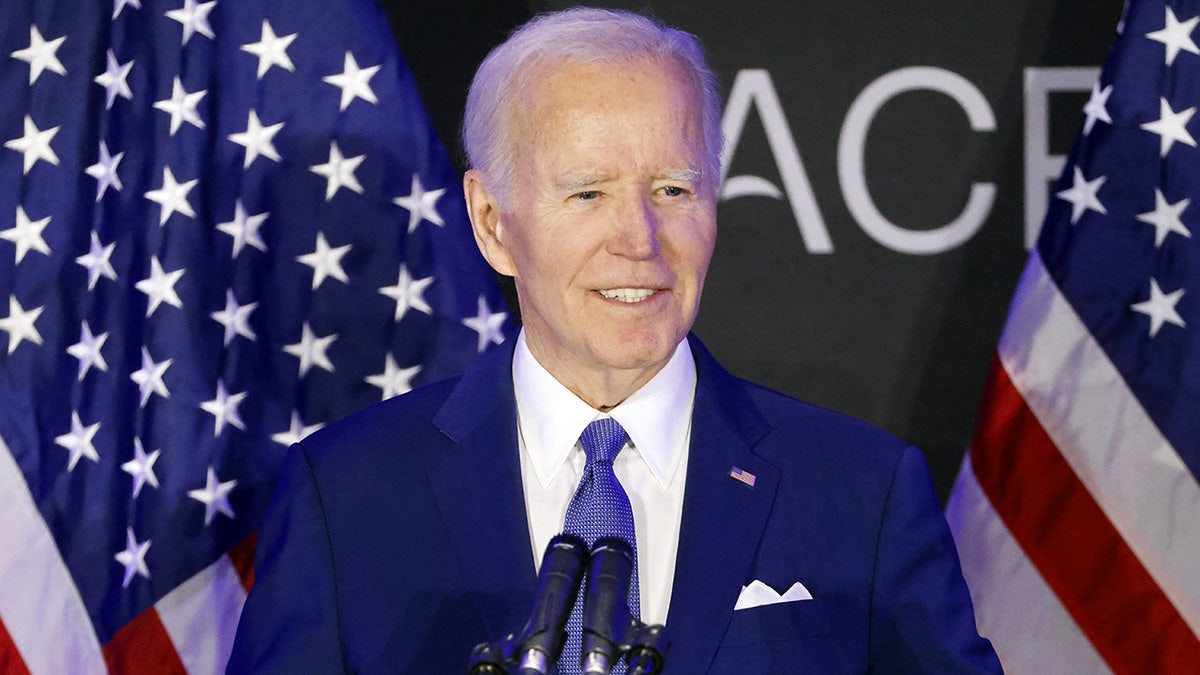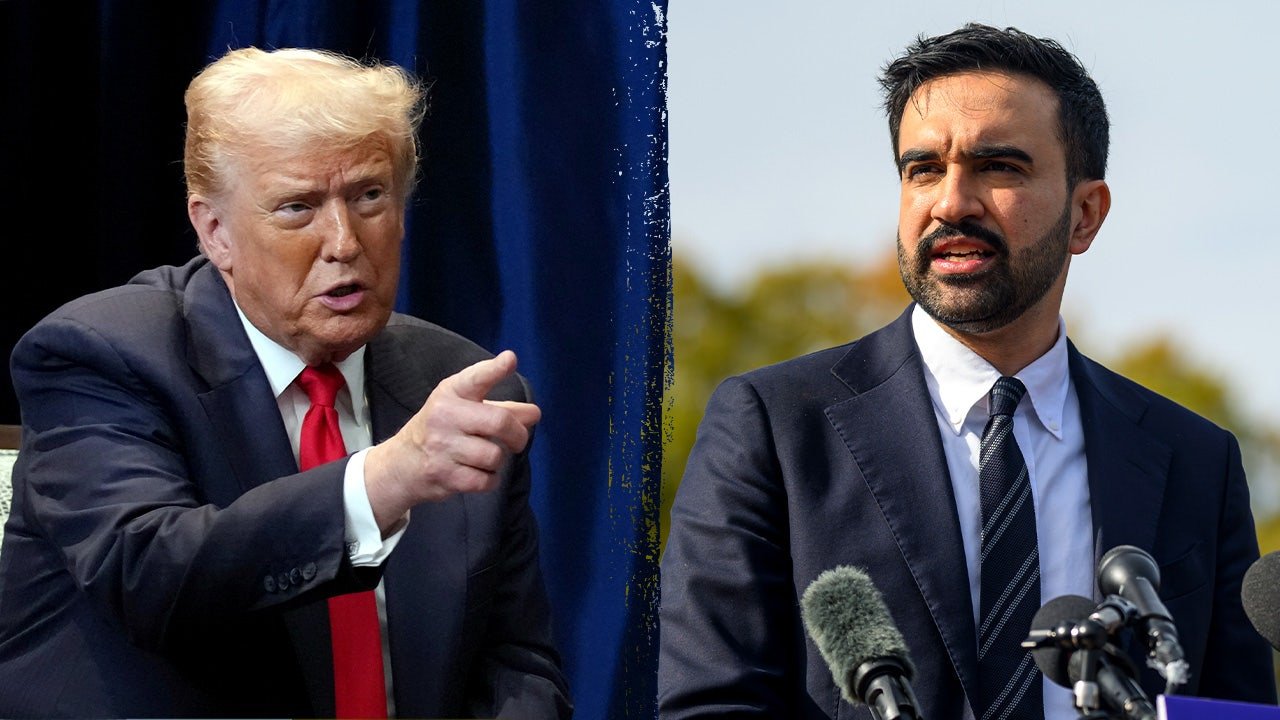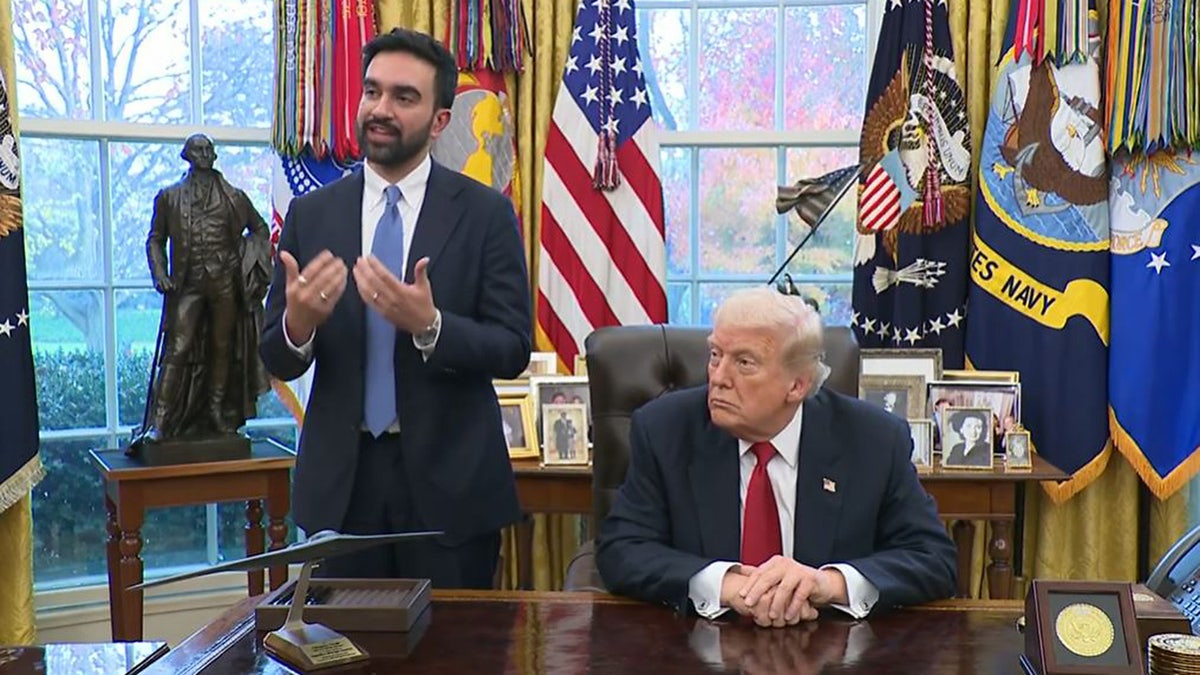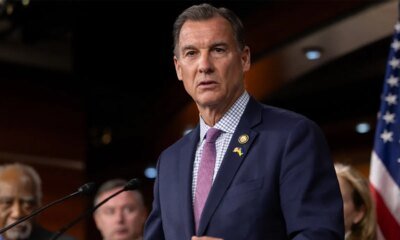INTERNACIONAL
Meet the ex-Biden appointee who could be major force against Trump’s AI agenda: ‘Doomsayer’

NEWYou can now listen to Fox News articles!
FIRST ON FOX: President Donald Trump’s push to establish «America’s global AI dominance» could run into friction from an unlikely source: the «effective altruism» movement, a small but influential group that has a darker outlook on artificial intelligence.
Trump signed an executive order earlier this year titled, «Removing Barriers to American Leadership in Artificial Intelligence.» This week he met with top technology industry leaders, including Mark Zuckerburg, Bill Gates and others, for meetings at the White House in which AI loomed large in the discussions. However, not all the industry’s leaders share the president’s vision for American AI dominance.
Jason Matheny, a former senior Biden official who currently serves as the CEO of the RAND Corporation, is a leader in the effective altruism movement, which, among other priorities, seeks to regulate the development of artificial intelligence with the goal of reducing its risks.
Effective altruism is a philanthropic social movement where proponents claim to be aiming to maximize the good they can do in the world and give to what they calculate are the most effective charities and interventions. Part of this movement includes powerful donors from across many sectors, including technology, where funds are poured into fighting against what the group sees as existential threats, including artificial intelligence.
NEW AI APPS HELP RENTAL DRIVERS AVOID FAKE DAMAGE FEES
US President Donald Trump delivers remarks at the «Winning the AI Race» AI Summit at the Andrew W. Mellon Auditorium in Washington, DC, on July 23, 2025. (Getty)
Some in the movement have also pledged to give away a portion of their income, while others have argued about the morality of earning as much money as possible in order to give it away.
A former Defense Department official familiar with the industry’s leaders told Fox News Digital that since a 2017 speech at an effective altruism forum in which he laid out his vision, Matheny has «been very deliberate about inserting personnel who share his AI-doomerism worldview» into government and government contractor roles.
«Since then, he has made good on every single one of his calls to action to explicitly infiltrate think tanks, in-government decision makers, and trusted government contractors with this effective altruism, AI kind of doomsayer philosophy,» the official continued.
A RAND Corporation spokesperson pushed back against this label and said that Matheny «believes a wide range of views and backgrounds are essential to analyzing and informing sound public policy. His interest is in encouraging talented young people to embrace public service.»
The spokesperson added that AI being an «existential threat» is «not the lens» through which the company approaches AI, but said, «Our researchers are taking a broad look at the many ways AI is and will impact society – including both opportunities and threats.»
In his 2017 speech, Matheny discussed his vision of influencing the government from the inside and outside to advance effective altruistic goals.
«The work that I’ve done at IARPA (Intelligence Advanced Research Projects Activity) has convinced me that there’s a lot of low-hanging fruit within government positions that we should be picking as effective altruists. There are many different roles that effective altruists can have within government organizations,» Matheny told an effective altruism forum in 2017, before going on to explain how even «fairly junior positions» can «wield incredible influence.»
GOOGLE CEO, MAJOR TECH LEADERS JOIN FIRST LADY MELANIA TRUMP AT WHITE HOUSE AI MEETING

Jason Matheny is an ex-appointee from former President Joe Biden’s administration, where he served in multiple roles between 2021 and 2022. (Tannen Maury/AFP via Getty Images)
Matheny went on to explain the need for «influence» on the «outside» in the form of contractors working for government agencies specialized in fields like biology and chemistry along with experts at various think tanks.
«That’s another way you can have an influence on the government,» Matheny said.
Matheny advanced the philosophy’s ideals in the Biden White House in his roles as deputy assistant to the president for technology and national security, deputy director for national security in the Office of Science and Technology Policy and coordinator for technology and national security at the National Security Council.
According to reporting by Politico, RAND officials were involved in writing former President Joe Biden’s 2023 executive order «Safe, Secure, and Trustworthy Development and Use of Artificial Intelligence.» The order mirrored many effective altruist goals regarding AI, such as the idea that «harnessing AI for good and realizing its myriad benefits requires mitigating its substantial risks.»
However, a RAND spokesperson told Fox News Digital that Matheny had «no role» crafting the Biden EO, but said its «researchers did provide technical expertise and analysis to inform the EO in response to requests from policymakers.»
The order read that «responsible AI use has the potential to help solve urgent challenges while making our world more prosperous, productive, innovative, and secure. At the same time, irresponsible use could exacerbate societal harms such as fraud, discrimination, bias, and disinformation; displace and disempower workers; stifle competition; and pose risks to national security.»

President Trump has made AI dominance a key part of his agenda. (Omar Marques/SOPA Images/LightRocket/CHARLY TRIBALLEAU/AFP)
Its solution was to increase regulations on the development of AI and add new government reporting requirements for companies developing the technology. For many in the industry, this was seen as an example of government overreach that stifled innovation and hurt the U.S.’s ability to compete with countries like China.
The order has since been revoked by Trump’s AI order, which was signed in the first few days of his second administration. However, as head of RAND, a public policy and research advising group, Matheny and RAND have continued to push their vision for AI regulation and warn about the potential pitfalls.
RAND has posted on social media in recent months warning that AI will «fundamentally reshape the economics of cybersecurity» and that the «growing use of AI chatbots for mental health support means society is ‘deploying pseudo-therapists at an unprecedented scale.’»
Semafor reported earlier this year that the Trump administration was butting heads with Anthropic, a top artificial intelligence company with ties to the EA movement and the Biden administration, on AI policy.
CLICK HERE TO GET THE FOX NEWS APP
«It’s hard to tell a clean story of every single actor involved, but at the heart, the Doomerism community that Jason’s really at the heart of, what they are really concerned with is they truly believe about a runaway super-intelligent model that takes over the world like a Terminator scenario,» the former DOD official told Fox News Digital, adding that the fear of Effective Altruists that AI is an «existential threat» has led to their push that is «restrictive» to the «growth of the technology.»
«With respect to the Trump administration’s AI policies, much RAND analysis is focused on key parts of the President’s AI Action Plan, including analysis we’ve done on AI evaluations, secure data centers, energy options for AI, cybersecurity and biosecurity,» the RAND spokesperson said.
«Mr. Matheny appreciates that the Trump Administration may have different views than the prior administration on AI policy,» the spokesperson continued. «He remains committed, along with RAND, to contributing expertise and analysis to helping the Trump Administration shape policies to advance the United States’ interests.»
artificial intelligence,joe biden,donald trump
INTERNACIONAL
La nieta de John F. Kennedy contó que le diagnosticaron cáncer terminal el mismo día que nació su segundo hijo

La nieta de John F. Kennedy, Tatiana Schlossberg, hizo una dolorosa revelación: en un escrito a corazón abierto, contó que padece cáncer terminal y que se enteró del diagnóstico el mismo día que nació su beba.
La impactante noticia llegó en mayo del año pasado, cuando tenía 34 años. Acababa de ser madre por segunda vez y un análisis de rutina mostró un elevado número de glóbulos blancos que se transformó en un resultado devastador: una variante con una mutación poco frecuente de una leucemia mieloide aguda.
Leé también: Alineamiento con EE.UU. y Medio Oriente: las razones del histórico cambio de postura de la Argentina en el G20
En el ensayo publicado en The New Yorker Tatiana reveló que uno de los médicos que la atiende le advirtió que podría llegar a tener solo “un año más de vida” debido a la gravedad de su cuadro.
“No podía creer que estuvieran hablando de mí. El día anterior había nadado una milla con nueve meses de embarazo. No estaba enferma”, escribió en el inicio del artículo..
A partir del diagnóstico, la mujer atravesó múltiples rondas de quimioterapia, dos trasplantes de médula ósea —el primero con células de su hermana y el segundo de un donante anónimo— y participó en ensayos clínicos experimentales. En un ensayo a corazón abierto, Schlossberg habló de la dura situación que atraviesa. (Foto: REUTERS/Brian Snyder)
En septiembre, además, le diagnosticaron una variante del virus de Epstein-Barr que afectó gravemente sus riñones y la obligó a aprender a caminar nuevamente.
“Me siento engañada y triste por no poder seguir viviendo la maravillosa vida que teníamos”, lamentó la periodista ambiental que está casada con el médico George Moran, con quien tiene dos hijos.
Durante su ensayo, Tatiana también criticó a Robert F. Kennedy Jr., sobrino de su madre y actual secretario de Salud en la administración Trump y sostuvo que las políticas que impulsa podrían perjudicar a pacientes como ella al recortar inversiones en vacunas de ARNm, tecnología que, según explicó, podría usarse contra ciertos tipos de cáncer. “Era una vergüenza para mí y para mi familia inmediata”, resaltó.
Leé también: Video: un tiroteo en plena celebración navideña terminó con cuatro heridos en Carolina del Norte
En el mismo sentido, sostuvo que los recortes federales podrían afectar a la institución en la que se trata: “De repente, el sistema de salud del que dependía se volvió inestable”, lamentó.
“Durante toda mi vida traté de ser buena hija, buena hermana, buena persona y ahora he agregado una nueva tragedia a nuestra familia, y no hay nada que pueda hacer para evitarlo”, expresó.
Schlossberg siente el peso de haber estado lejos de sus hijos, su beba de apenas poco más de un año y su hijo de 3 años, en momentos irrecuperables: no pudo cuidar a su hija por riesgo de infección y teme que, si muere, ellos apenas la recuerden. Por eso, asegura, busca dejarles buenos momentos: pequeños gestos, frases, escenas cotidianas que conserva como un archivo emocional ante la fragilidad del futuro.
Las tragedia de los Kennedy: la foto que muestra un momento antes del asesinato de John F. Kennedy (Foto archivo AP)
La periodista también le dedicó unas palabras a su pareja: “George hizo todo lo que pudo por mí. Habló con todos los médicos y aseguradoras con los que yo no quería hablar; durmió en el suelo del hospital; no se enojó cuando yo estaba furiosa por los esteroides y le grité que no me gustaba la cerveza Schweppes Ginger Ale, solo la Canada Dry. Iba a casa a acostar a nuestros hijos y volvía a traerme la cena».
Por otro lado, se refirió a su familia: “Mis padres, mi hermano y mi hermana también han criado a mis hijos y han estado en mis diversas habitaciones del hospital casi a diario durante el último año y medio. Me han sostenido con firmeza mientras he sufrido, intentando disimular su dolor y tristeza para protegerme. Esto ha sido un gran regalo, aunque siento su dolor a diario. Durante toda mi vida, he intentado ser buena, buena estudiante, buena hermana y buena hija, y proteger a mi madre y nunca hacerla enfadar ni molestar. Ahora he añadido una nueva tragedia a su vida, a la vida de nuestra familia, y no puedo hacer nada para detenerla”.
En paralelo a su lucha física, la escritora intenta sostener su identidad profesional: recuerda el libro sobre océanos que ya no podrá escribir y se aferra al sentido de su oficio para transmitirle a su hijo que su vida fue más que una larga enfermedad. Consciente de la posibilidad de un final cercano, la autora se mueve entre recuerdos de su infancia, escenas con sus hijos y reflexiones sobre la memoria y la muerte. Vive el presente como puede, aferrada al deseo de que esos momentos —aunque ella no pueda conservarlos— queden en la vida de quienes ama.
“Principalmente, intento vivir y estar con ellos ahora. Pero estar en el presente es más difícil de lo que parece, así que dejo que los recuerdos vayan y vengan. Son tantos de mi infancia que siento como si me viera crecer a mí misma y a mis hijos al mismo tiempo. A veces me engaño pensando que lo recordaré para siempre, que lo recordaré cuando muera. Obviamente, no. Pero como no sé cómo es la muerte y no hay nadie que me diga qué viene después, seguiré fingiendo. Seguiré intentando recordar”, concluyó.
Asesinatos y siniestros fatales: desde los crímenes de su abuelo John F. Kennedy en 1963 y de su tío abuelo Robert Kennedy en 1968, al accidente aéreo de su tío, John F. Kennedy Jr., en 1999, la historia de su familia está cargada de tragedias.
John F. Kennedy, nieta, Cáncer
INTERNACIONAL
Trump caps week of surprises — signing release of Epstein files, embracing unlikely allies at White House

NEWYou can now listen to Fox News articles!
President Donald Trump kicked off the week meeting with Saudi Crown Prince Mohammed bin Salman and closed the week meeting with New York City Mayor-elect Zohran Mamdani.
He also signed legislation ordering the Justice Department to release files related to the late financier and convicted sex offender Jeffrey Epstein.
Here’s a look at what happened this week.
Epstein files
Trump announced Wednesday evening that he put his stamp of approval on a bill instructing the Justice Department to release files related to Epstein — after Congress passed the measure Tuesday.
TRUMP SAYS WHETHER HE WOULD SIGN EPSTEIN FILES BILL
«I HAVE JUST SIGNED THE BILL TO RELEASE THE EPSTEIN FILES!» Trump wrote in a lengthy message on the Truth Social platform. «As everyone knows, I asked Speaker of the House Mike Johnson, and Senate Majority Leader John Thune, to pass this Bill in the House and Senate, respectively. Because of this request, the votes were almost unanimous in favor of passage.
«At my direction, the Department of Justice has already turned over close to fifty thousand pages of documents to Congress. Do not forget — The Biden Administration did not turn over a SINGLE file or page related to Democrat Epstein, nor did they ever even speak about him.»
Trump’s ties to Epstein had faced increased attention after Trump’s Justice Department and FBI announced in July it would not unseal investigation materials related to Epstein, and that the agencies’ investigation into the case had closed.
Jeffrey Epstein and Donald Trump pose together at the Mar-a-Lago estate, Palm Beach, Florida, Feb. 22, 1997. (Davidoff Studios/Getty Images)
TRUMP CALLS ON HOUSE REPUBLICANS TO VOTE TO RELEASE EPSTEIN FILES: ‘WE HAVE NOTHING TO HIDE’
However, Trump announced Nov. 16 that he backed releasing the documents, claiming that he had «nothing to hide.»
Ultimately, the House voted Tuesday to release the files by a 421–1 margin, following pressure for months from the measure’s ringleaders, Reps. Thomas Massie, R-Ky., and Ro Khanna, D-Calif., and other Democrats.
The Senate passed the measure by unanimous consent later Tuesday.
BIDEN’S SAUDI FIST BUMP DREW HEAT IN 2022 — TRUMP JUST ROLLED OUT THE RED CARPET
Mamdani meeting
Mamdani visited Trump at the White House Friday, and the two appeared chummy and ready to launch a fresh start in their relationship. The two said they discussed addressing affordability issues and improving conditions in New York.
Trump said the two had more in common than he anticipated, and that he would be «cheering» for Mamdani as he leads the city.
«I expect to be helping him, not hurting him — a big help,» Trump said.

New York City Mayor-elect Zohran Mamdani and President Donald Trump take questions from the press following their one-on-one meeting, Friday, in the Oval Office of the White House. (Pool/Fox News)
EPSTEIN REFERENCED TRUMP IN PRIVATE EMAILS TO GHISLAINE MAXWELL AND OTHERS, NEW RECORDS SHOW
Trump also brushed off Mamdani’s comment labeling him a despot in his victory speech following the Nov. 4 election, with the president claiming Friday he’s encountered worse and that he believes Mamdani will change his tune as the two work together.
«I’ve been called much worse than a ‘despot,’ so it’s not, it’s not that insulting,» Trump said. «I think he’ll change his mind after we get to working together.»
Saudi crown prince meeting
Trump also met with the Saudi Crown Prince Mohammed bin Salman at the White House Tuesday, an occasion that included a red carpet rolled across the South Lawn, military honor guard, and an Air Force flyover to elevate the formal state-level welcome.
During bin Salman’s visit, the U.S. announced that it would sell F-35 jets to Saudi Arabia, and that it would now be a «major non-NATO ally» to facilitate military cooperation between the two countries.
«President Trump approved a major defense sale package, including future F-35 deliveries, which strengthens the U.S. defense industrial base and ensures Saudi Arabia continues to buy American,» the White House said in a statement.
Trump’s reception of bin Salman is a departure from the Biden administration, who said in 2019 during his presidential campaign that he would make Saudi Arabia «the pariah that they are» because of the death of Washington Post journalist Jamal Khashoggi.

President Donald Trump’s reception of Crown Prince and Prime Minister of the Kingdom of Saudi Arabia Mohammed bin Salman is a departure from the Biden administration. (Brendan Smialowski/AFP via Getty Images)
U.S. intelligence agencies concluded in 2021 that bin Salman gave the green light on the operation that took Khashoggi’s life. Khashoggi, a Saudi dissident, was brutally murdered in Istanbul at the Saudi consulate in 2018.
But Trump defended bin Salman Tuesday, and accused a reporter who asked about U.S. intelligence reports linking the prince to Khashoggi’s death of embarrassing bin Salman.
CLICK HERE TO DOWNLOAD THE FOX NEWS APP
«A lot of people didn’t like that gentleman that you’re talking about,» Trump said Tuesday. «Whether you like him or didn’t like him, things happen, but he knew nothing about it. And would you leave it at that? You don’t have to embarrass our guest by asking a question.»
Even so, bin Salman has dismissed the reports as false. When asked Tuesday about Khashoggi, bin Salman said it’s «painful» to hear of the death of anyone for «no real purpose,» and «we are doing our best that this doesn’t happen again.»
INTERNACIONAL
Trump admin slams South Africa for ‘weaponized’ G-20 presidency as summit ignores Christian persecution

NEWYou can now listen to Fox News articles!
JOHANNESBURG: The White House has mounted a new verbal attack on South Africa over the G-20 Leaders’ Summit in Johannesburg this weekend. White House deputy press secretary Anna Kelly hit back at South African President Cyril Ramaphosa after Pretoria refused to allow a U.S. embassy delegation to take part in the summit’s closing ceremony.
The U.S. takes over the G-20’s presidency next year. But Ramaphosa’s spokesperson told reporters here at the summit their president won’t perform the ceremonial handover to a junior diplomat. Washington had asked to send the embassy’s chargé d’affaires to the ceremony.
In what is becoming an increasingly fractious back-and-forth of bitter statements between Pretoria and Washington on several issues around the G-20, Kelly told Fox News Digital, «President Ramaphosa initially declared that he would pass the gavel to an ‘empty chair.’ Now, he’s refusing to facilitate a smooth transition of the G-20 presidency at all.»
WHITE HOUSE SHUTS DOWN REPORTS US BACKTRACKED ON TRUMP’S G20 BOYCOTT
South African President Cyril Ramaphosa addresses the opening session of the G-20 leaders’ summit in Johannesburg, South Africa, Saturday, Nov. 22, 2025. (Misper Apawu/AP Phot/Pool)
Kelly continued, «This, coupled with South Africa’s push to issue a G-20 Leaders Declaration, despite consistent and robust U.S. objections, underscores the fact that they have weaponized their G-20 presidency to undermine the G-20’s founding principles. President Trump looks forward to restoring legitimacy to the G-20 in the U.S.’s 2026 host year.»
Trump withdrew all U.S. participation in the summit over his claims that some White South Africans were being racially discriminated against.
Now South Africa’s chief rabbi, Dr. Warren Goldstein, has also lashed out at the G-20, speaking exclusively to Fox News Digital, saying, «How can it be that in the long wish list of items that make up the G-20 Leaders Declaration, there wasn’t space to condemn one of the greatest human rights crises in Africa – the continent wide jihadi war on Christians?»
He continued «How can it be that the first G-20 hosted in Africa by an African government ignores how Africa – from Mozambique to Mali, the DRC, Nigeria, Sudan and so many other countries – has become the central front of Islamist terrorism?
TRUMP PICKS HIS MIAMI DORAL RESORT TO HOST 2026 G20 SUMMIT IN FLORIDA DURING NATION’S ANNIVERSARY YEAR

Members of St. Leo Catholic Church hold a procession to mark Palm Sunday in Ikeja, Lagos, Nigeria, on April 13, 2025. (Adekunle Ajayi/Getty Images)
«Just Friday, more than 300 girls and 12 teachers were kidnapped from a Catholic school in Nigeria,» he added. «Who will speak up for these children and save them? The silence of the G-20 declaration on this and other jihadi atrocities on the continent is a moral disgrace, revealing the gathering to be a heartless charade that history will judge harshly. God’s condemnation of Cain following his feeble defense of ‘Am I my brother’s keeper?’ stands as an eternal accusation against the leaders of the G-20 – ‘What have you done? The blood of your brother calls out to Me from the ground.’»
Forty-two world leaders and major institutions such as the U.N. are represented at the summit. Only one of them, Italy’s President Giorgia Meloni, has addressed the issue of Christian persecution in the last few days – and she did that Friday, before the summit started. Posting on X, she wrote, «We ask the Nigerian government to strengthen the protection of Christian communities and all religious communities and to pursue those responsible for these heinous attacks.»
The White House could question the validity of the Leaders’ Declaration produced at the G-20. Ramaphosa conceivably didn’t realize his microphone was open right at the beginning of proceedings Saturday. Journalists in the media center next door to the main summit hall could hear him telling leaders that the final 122-point resolution was ready for them to endorse – before they had discussed it.

The U.S. flag at the G-20 media center in South Africa on Nov. 22, 2025. (Paul Tilsley for Fox News Digital)
CLICK HERE TO DOWNLOAD THE FOX NEWS APP
As it stands, South Africa has officially marked the U.S. as «absent» from this G-20 summit. The only U.S. presence here this weekend was the American flag in the media center.
The final G-20 South Africa Summit Leaders’ Declaration was released on Sunday with the only reference to religion, noting, «We condemn all attacks against civilians and infrastructure. We further reaffirm that in line with the U.N. Charter, all states must refrain from the threat or use of force to seek territorial acquisition against the territorial integrity and sovereignty or political independence of any state and that states should develop friendly relations among nations, including by promoting and encouraging respect for human rights and for fundamental freedoms for all without distinction as to race, sex, language, or religion. We condemn terrorism in all its forms and manifestations.
Fox News Digital reached out to the South African government but did not receive a response.
donald trump,g20,africa,south africa,christianity religion,persecutions

 POLITICA2 días ago
POLITICA2 días agoTras la orden de decomiso de los bienes de CFK, la Justicia evalúa avanzar sobre el departamento de San José 1111

 POLITICA2 días ago
POLITICA2 días agoJavier Milei sobre las coimas en la ANDIS: “Hay mucha mala intención política”

 POLITICA3 días ago
POLITICA3 días agoCornejo criticó a la AFA de Chiqui Tapia y sostuvo que un cambio de reglas condenó al descenso a Godoy Cruz



























